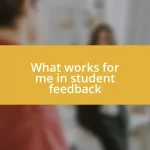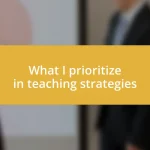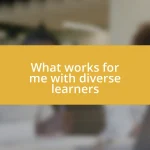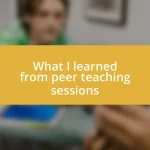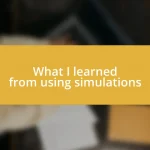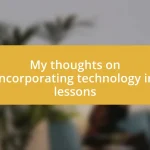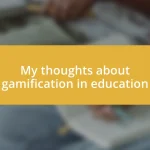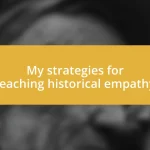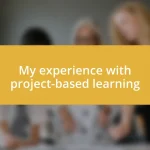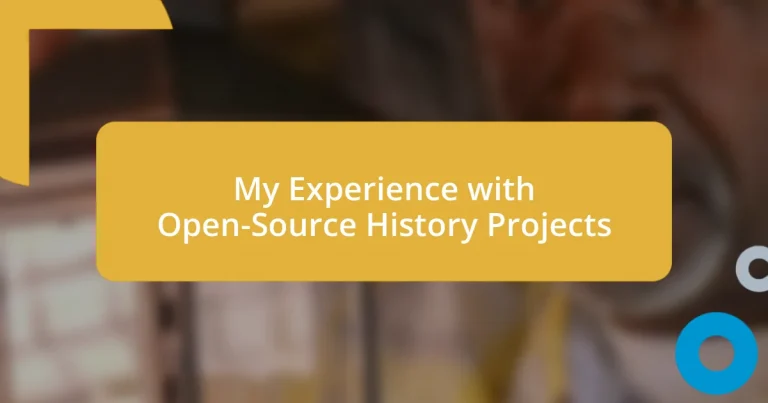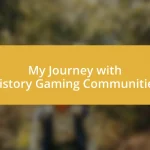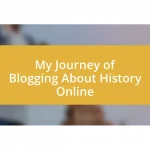Key takeaways:
- Open-source history projects empower individuals to collaboratively document and analyze historical events, fostering diverse contributions and community engagement.
- Participation enhances skills, builds friendships, and democratizes history by amplifying underrepresented voices and narratives.
- Effective use of digital tools and transparent documentation enriches collaboration, promotes trust within teams, and allows for the sharing of experiences to inspire future contributors.
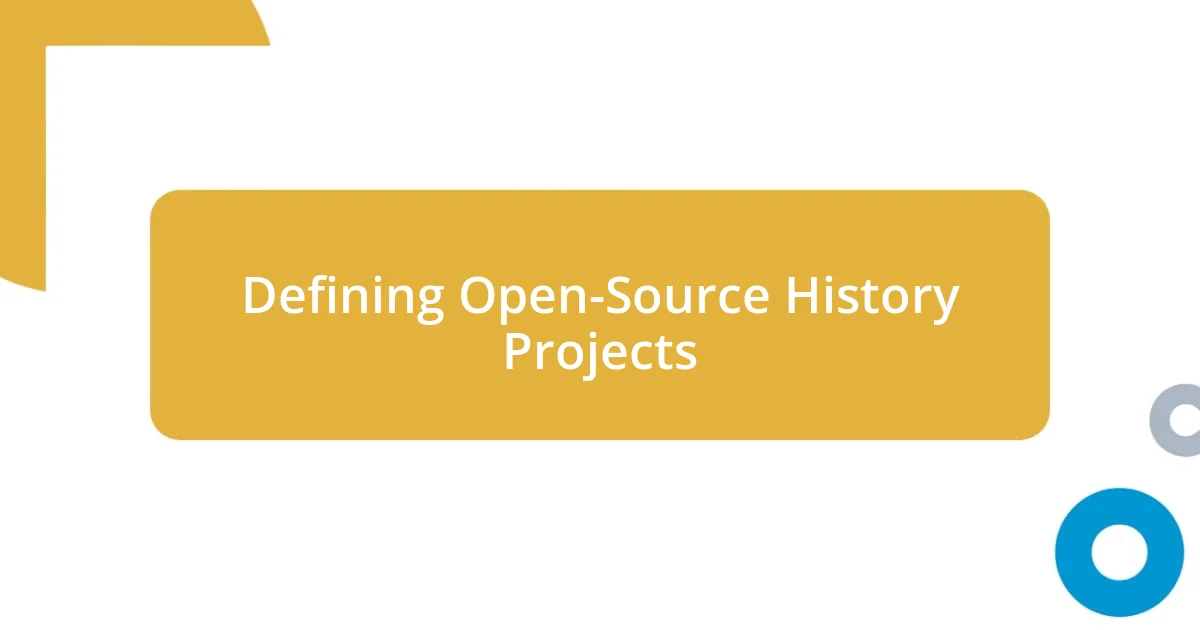
Defining Open-Source History Projects
Open-source history projects are collaborative initiatives where individuals contribute to the documentation and analysis of historical events, making knowledge accessible to everyone. I remember my first encounter with such a project—it felt electrifying to see contributions from people across the globe, each bringing unique perspectives that enriched our understanding of shared history. Isn’t it fascinating how diverse viewpoints can illuminate narratives that might have otherwise remained obscure?
In essence, these projects rely on public participation, encouraging scholars and enthusiasts alike to upload, edit, and refine historical data. I was once involved in a project focused on local history, and I found it incredibly rewarding to piece together stories from different generations within my community. The emotional connection to my own history made me realize how important it is to preserve and share these narratives for future generations.
At the heart of open-source history projects is a commitment to transparency and collaboration; it stands in stark contrast to traditional historical research, which can be cloistered and exclusive. This collaborative spirit poses an intriguing question: what if anyone, regardless of their background, could be a historian? Each contribution, no matter how small, has the potential to shape collective memory—an idea that fills me with hope and purpose.
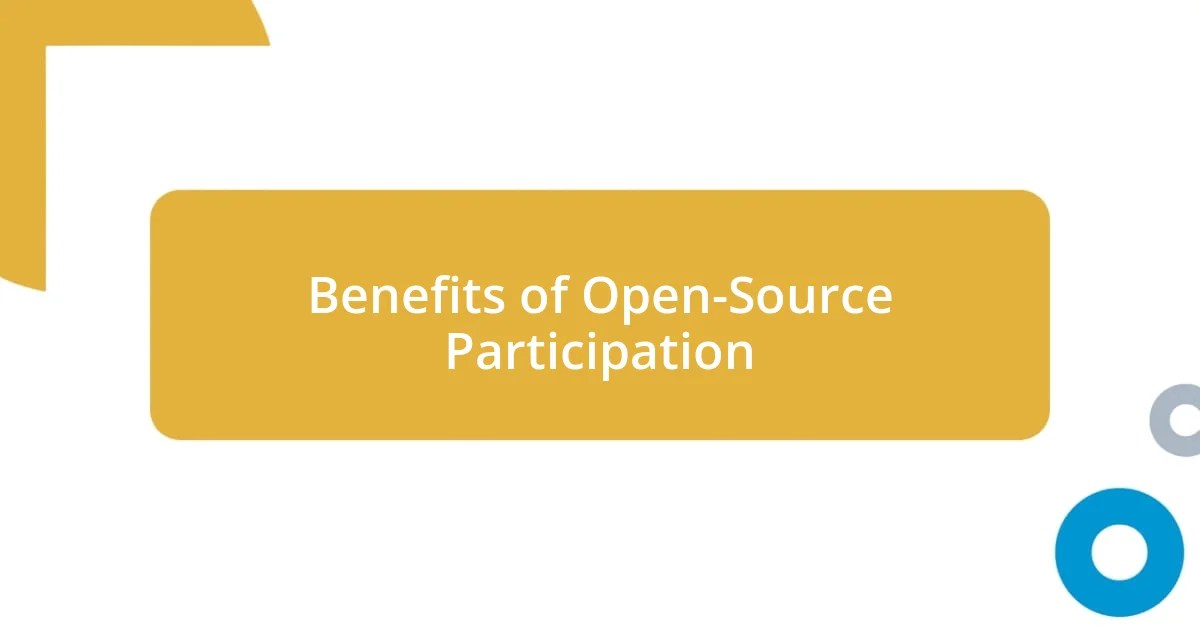
Benefits of Open-Source Participation
Participating in open-source history projects brings a profound sense of community. I’ve experienced this firsthand when I collaborated with passionate individuals from various backgrounds. Each meeting felt like a gathering of friends, with shared goals and enthusiasm that transformed what could have been a tedious task into a joyful exploration of our past. This camaraderie not only makes historical research enjoyable but fosters friendships that can last beyond the project itself.
Another notable benefit is the skill development that occurs through active participation. While working on a collaborative timeline, I learned valuable skills in research and digital tools that I never expected to acquire. I remember struggling with data visualization software, but the support from the group was invaluable. Not only did I enhance my technical skills, but I also gained confidence in my ability to contribute meaningfully to a broader narrative.
Moreover, open-source participation democratizes history and broadens access to knowledge. As someone who once struggled to access primary sources in my studies, I was exhilarated to see how these projects empower communities to share their own stories. I found it moving when local historians from underrepresented areas shared their narratives, revealing histories that were often overlooked. It’s exciting to think about how these contributions could inspire future researchers and historians.
| Benefit | Description |
|---|---|
| Community Building | Fosters friendships and allows collaboration among diverse individuals. |
| Skill Development | Participants enhance their research, technical, and analytical skills. |
| Democratization of History | Empowers marginalized voices to share their narratives and enrich the historical canon. |
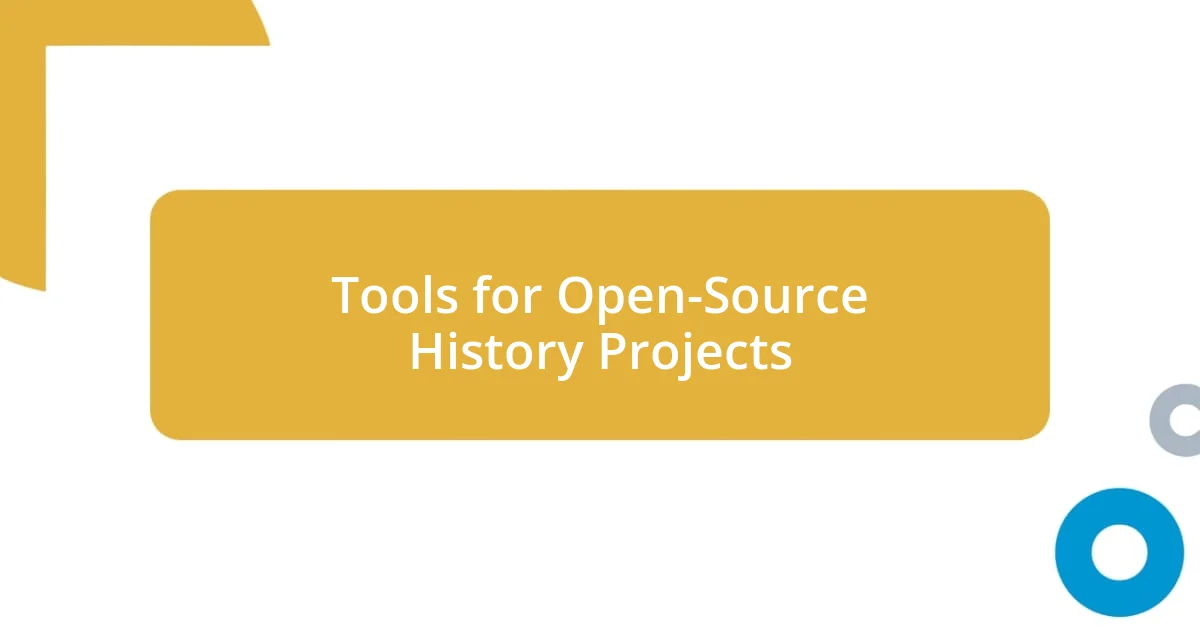
Tools for Open-Source History Projects
Tools are essential for bringing open-source history projects to life. In my experience, the right software can transform the way we work together, allowing us to curate, share, and analyze historical information seamlessly. When I first started, I was pleasantly surprised by how intuitive many of these tools were, making them accessible even to those without extensive technical backgrounds.
Here are some of the most effective tools for open-source history projects:
- Wikimedia Commons: A fantastic platform for sharing images and documents related to historical events, enabling easy access for all.
- GitHub: Originally designed for code, this platform is also great for tracking changes in written contributions and facilitating collaborative editing.
- Omeka: I found this digital collection tool useful for creating online exhibits that showcase historical artifacts in a visually compelling way.
- StoryMapJS: This tool helped me craft narratives by allowing me to map historical events interactively, which resonated deeply with my audience.
- Google Docs: A staple in collaboration, it allows multiple users to edit documents simultaneously, which was a game-changer for my projects.
Every project will have a distinct flavor based on the tools selected. For instance, using StoryMapJS during a local history project allowed my team to vividly illustrate the journey of our town’s founding, immersing viewers in a rich multimedia experience. I remember the excitement in our discussions when we saw how animation helped our historical narrative come to life—it truly sparked a sense of pride in our contributions.
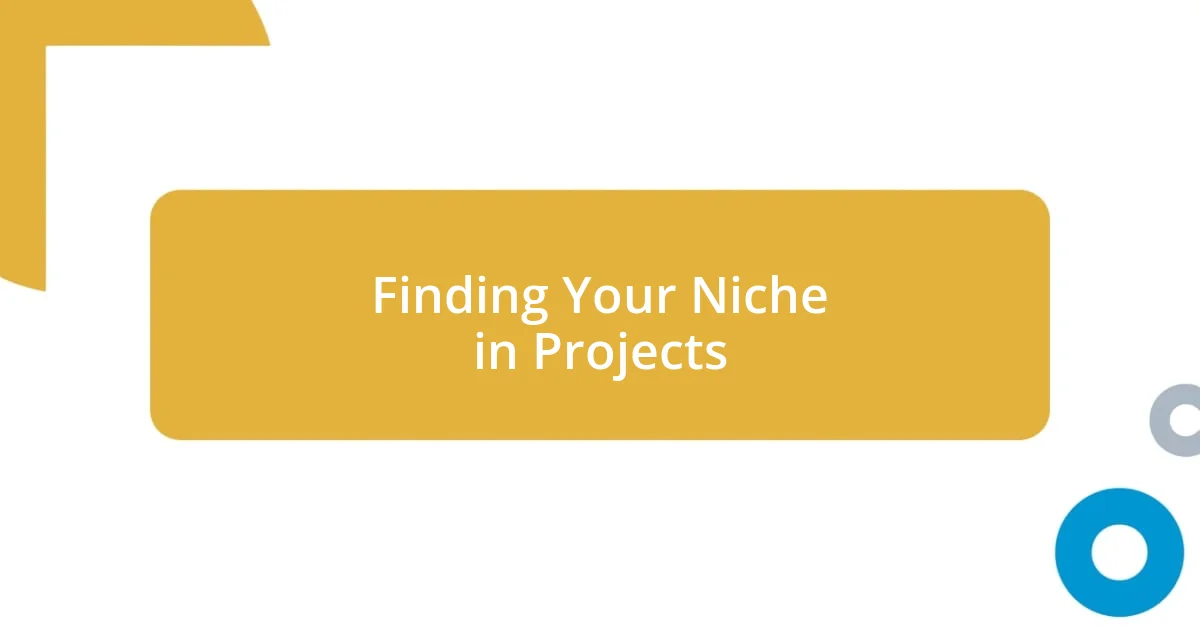
Finding Your Niche in Projects
Finding your niche in open-source history projects can be a rewarding journey. When I first dove into these initiatives, I found myself drawn to local history, which made every discovery personal and impactful. Have you ever felt that deep connection to your surroundings? For me, researching the underrepresented stories in my community was not just about facts; it was about reviving memories that deserved to be shared.
As I explored various aspects of collaborative projects, I realized that everyone brings unique skills to the table. I’ve encountered individuals who excel at writing, others who are tech-savvy, and some who have an eye for design. This diversity is what makes these projects stand out. I still cherish the moment when a fellow participant, a graphic designer, turned our dry timelines into visually captivating stories that engaged our community’s interest. That was a game-changer, revealing how vital it is to find your role where you can shine while supporting others.
Reflecting on my experiences, I’ve learned that narrowing down your focus can enhance your contributions significantly. When I started specializing in digital archiving techniques, I not only became a resource for the team but also built a sense of ownership in the project. Isn’t it fulfilling to become the go-to person for a specific aspect? As you search for your niche, consider what excites you the most within the realm of history—your passion will inevitably elevate the entire project.
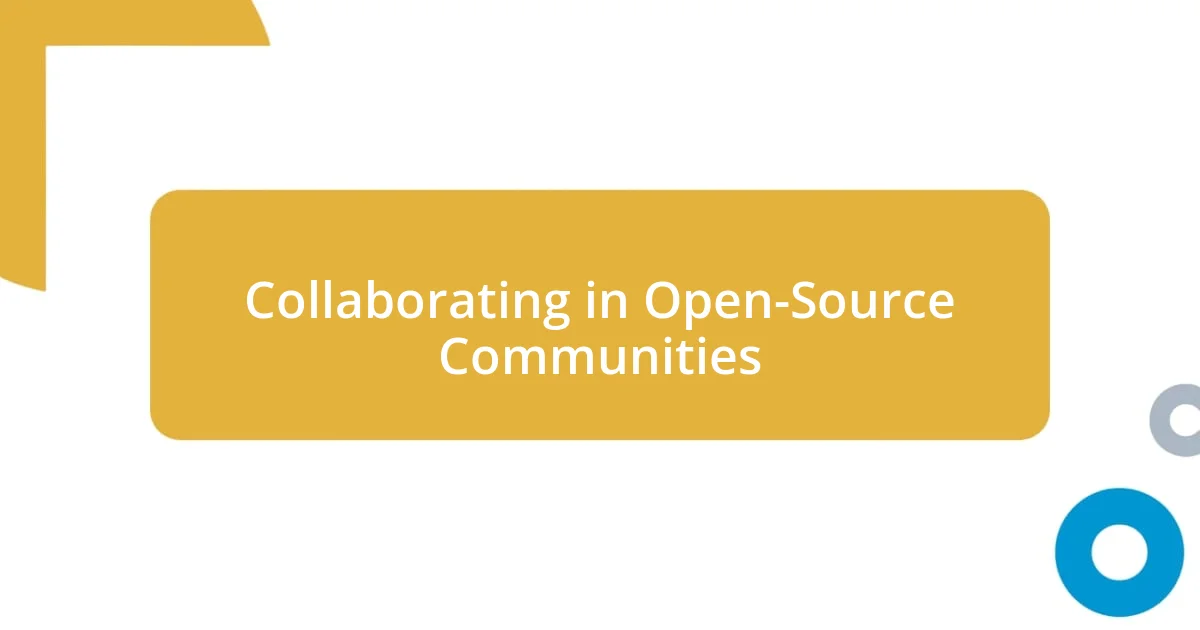
Collaborating in Open-Source Communities
Collaborating in open-source communities has an energy that’s hard to find elsewhere. I recall my first online meeting with a diverse group of volunteers; the excitement was palpable as we shared ideas and perspectives. Have you ever joined a discussion where everyone brought their unique experiences? It was incredible to witness how our collective knowledge transformed our project into something far more enriching than I could have imagined.
One of my memorable collaborations involved a group of history buffs working on a digital archive. We utilized tools like Slack for communication, which kept our conversations lively and organized. I often found myself inspired by others’ enthusiasm and creativity, rekindling my own passion for storytelling. It was during this collaboration that I realized that open-source doesn’t just mean sharing resources; it’s about building a community where every voice matters. I still remember the thrill of refining our project together, each member having a role that contributed to a greater purpose.
As I navigated various open-source projects, I encountered the beauty of feedback loops. Whenever I received constructive criticism on my writing, I felt my skills sharpen significantly. I learned that it’s essential to approach these projects with an open mindset and a willingness to grow. Isn’t it fascinating how collaborative efforts can lead to personal development? Reflecting on this, I’ve come to appreciate the vulnerability involved in sharing ideas and receiving feedback, as it ultimately strengthens our collective efforts.
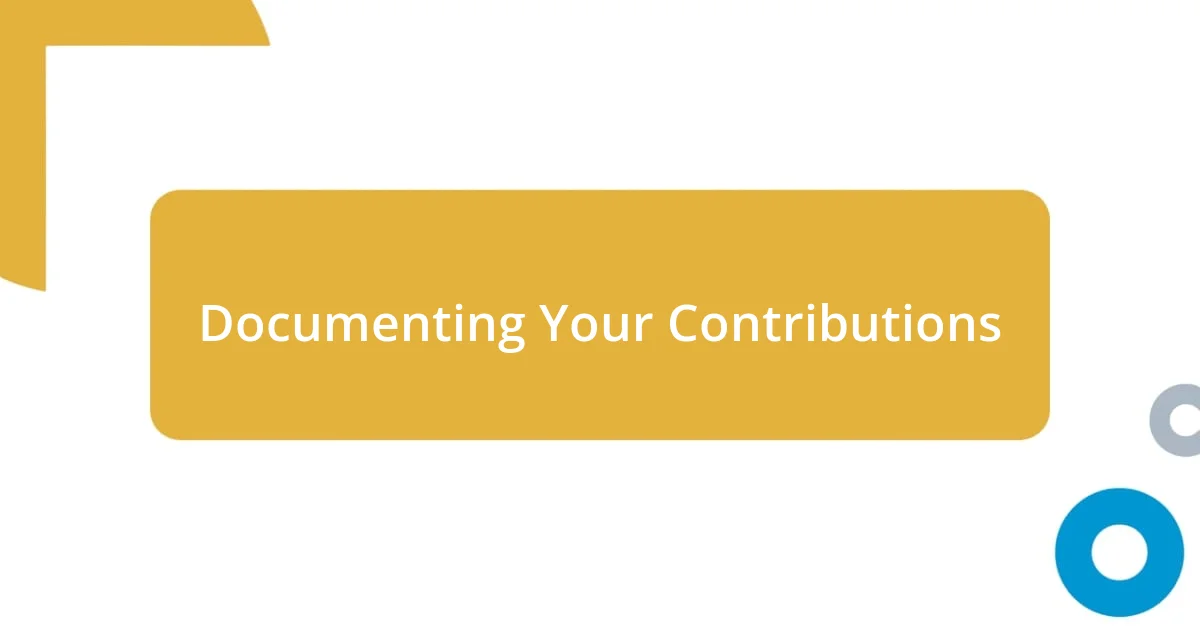
Documenting Your Contributions
Documenting your contributions in open-source projects is crucial for several reasons. Personally, I’ve found that keeping a detailed record of my work not only showcases my efforts but also helps create a roadmap for future contributors. Have you ever sat down to reflect on how far you’ve come in your projects? It’s eye-opening! For instance, I started with simple edits and gradually tackled more complex tasks, and seeing that progression has always motivated me to push further.
When it comes to documentation methods, I’ve experimented with various tools—ranging from straightforward text files to collaborative platforms like GitHub. Sharing my journey through detailed logs and notes has enabled others to follow in my footsteps or build upon what I’ve done. I recall one project where my comprehensive documentation of research sources became an essential resource for new team members, easing their onboarding process. Isn’t it rewarding to know that your efforts can lighten someone else’s load?
Additionally, I learned the importance of transparency. My contributions sometimes sparked discussions among team members about the decisions I made. By openly sharing not just what I did, but the thought process behind it, I fostered an environment of trust and collaboration. Have you noticed how open dialogues about our contributions can strengthen team cohesion? Seeing my peers engage with my documentation has shown me that sharing isn’t just about listing tasks; it’s about weaving a narrative that others can connect with and learn from.
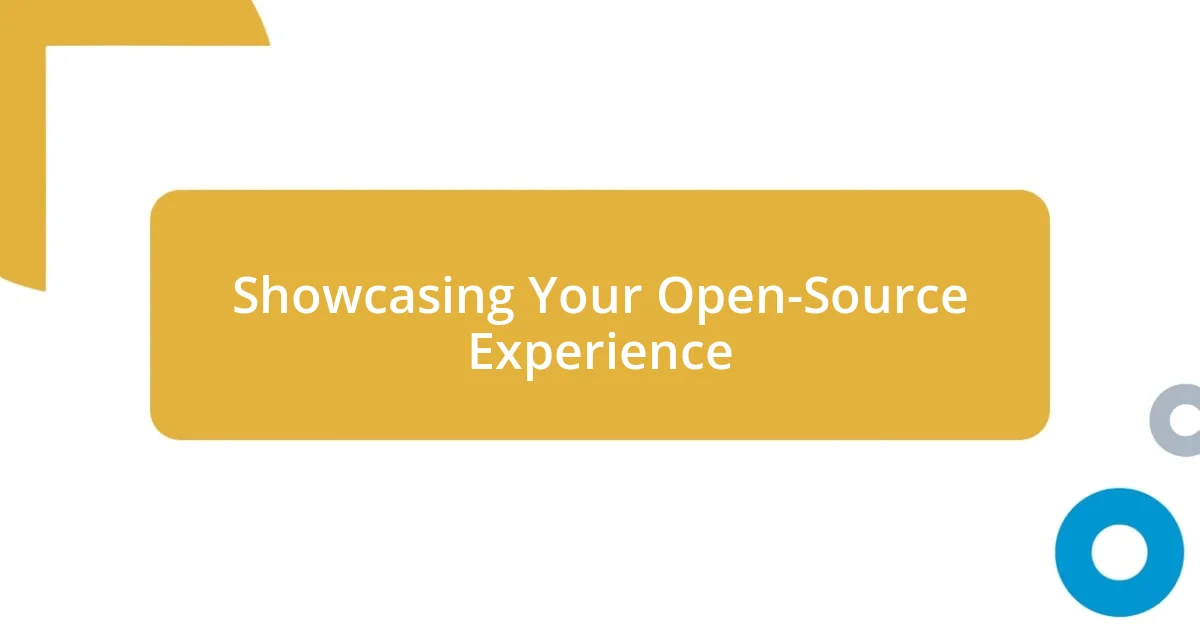
Showcasing Your Open-Source Experience
Showcasing your open-source experience is more than just listing contributions; it’s about telling a story that reflects your journey. I remember a pivotal moment when I showcased my first major project at a community conference. Standing there, I felt a rush of pride as I explained not just the work I had done, but also the challenges I faced and overcame. Isn’t it incredible how sharing these moments can inspire others to tackle their own projects with confidence?
I also found that presenting my experience through blog posts or video tutorials transformed my understanding of the material. One time, I created a video walkthrough of a complex feature I’d developed, and the responses were overwhelmingly positive. It made me realize that by breaking down my process, I could help demystify complex topics for others. Don’t you think it’s rewarding to turn your struggles into stepping stones for someone else’s success?
Moreover, engaging with the community through social media helped amplify my open-source narrative. I often share updates about ongoing projects, and one day, a stranger reached out, inspired to collaborate on a related idea. That connection was a vivid reminder of the power of sharing. Have you ever considered how a simple post can forge valuable relationships? Ultimately, showcasing our open-source experience allows us to reach beyond ourselves, fostering a sense of belonging and collaboration in a vibrant community.
